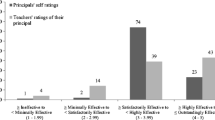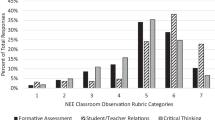Abstract
This paper describes the characteristics of a statewide principal evaluation system. Present empirical knowledge of the ways school principals are evaluated is almost nonexistent (Harrison, 1985); because of this we will employ a design drawn from studies of evaluation in other settings (Dornbusch and Scott, 1975), of teachers (Natriello and Dornbusch, 1981) and control of principals (Peterson, 1984). A questionnaire was used to gather information about the ways principals are evaluated as reported by principals and superintendents. The authors find that even when an evaluation system is detailed, specific, and statewide, inconsistencies develop because of the special nature of principals' work. The systems appear to break down in the sampling of performance and outputs and in the communication of negative feedback-key areas if principals are to improve their performance. Suggestions for research and practice are presented.
Similar content being viewed by others
References
Crowson, R. L., and Morris, V. C. (1985). Administrative control in large-city school systems: An investigation in Chicago.Educational Administration Quarterly 21: 51–70.
Darling-Hammond, L., Wise, A. E., and Pease, S. R. (Fall 1983). Teacher evaluation in the organizational context: A review of the literature.Review of Educational Research 53: 285–328.
Dornbusch, S. D., and Scott, W. R. (1975).Evaluation and the Exercise of Authority. San Francisco: Jossey-Bass.
Downs, A. (1967).Inside Bureaucracy. Boston: Little, Brown.
Duke, D. L., and Stiggins, R. J. (1985). Evaluating the performance of principals: A descriptive study.Educational Administration Quarterly, 71–98.
Dwyer, D. C. (1985). School leadership: A study of four principals.The Urban Review 17(3): 166–188.
Harrison, W. C. (1985). The perceptions of superintendents and principals regarding the evaluation of principals in North Carolina. Unpublished doctoral dissertation, George Peabody College for Teachers of Vanderbilt University, Nashville, Tenn.
Katz, D., and Kahn, R. L. (1966).The Social Psychology of Organizations. New York: John Wiley.
Lortie, D. C., Crow, G., and Prolman, D. (1983).Elementary Principals in Suburbia: An Occupational and Organizational Study Washington, D.C.: National Institute of Education.
McDowell, H. (1954).The role of the principal in the metropolitan school district. Unpublished doctoral dissertation, University of Chicago, Chicago, Ill.
Murphy, J., Hallinger, P., and Peterson, K. (1985, October). Supervising and evaluating principals: Lessons from effective districts,Educational Leadership 42: 78–82.
Natriello, G., and Dornbusch, S. M. (1981). Pitfalls in the evaluation of teachers by principals.Administrators Notebook 29(6): 1–4.
Ouchi, W. G. (1979). A conceptual framework for the design of organizational control systems.Management Science 25: 833–847.
Parsons, T. (1960).Structure and Process in Modern Society. New York: Free Press.
Peterson, K. D. (1978). The principal's tasks.The Administrator's Notebook 26: 1–4.
Peterson, K. D. (1982). Making sense of principals' work.The Australian Administrator 3: 1–4.
Peterson, K. D. (1984). Mechanisms of administrative control over managers in educational organizations.Administrative Science Quarterly 19: 573–597.
Thompson, J. D. (1967).Organizations in Action. New York: McGraw-Hill.
Turcotte, W. E. (1974). Control systems, performance, and satisfaction in two state agencies.Administrative Science Quarterly 19: 60–73.
Yin, K. Y. (1984).Case Study Research: Design and Methods. Beverly Hills, CA: Sage.
Author information
Authors and Affiliations
Rights and permissions
About this article
Cite this article
Harrison, W.C., Peterson, K.D. Pitfalls in the evaluation of principals. Urban Rev 18, 221–235 (1986). https://doi.org/10.1007/BF01112130
Issue Date:
DOI: https://doi.org/10.1007/BF01112130




